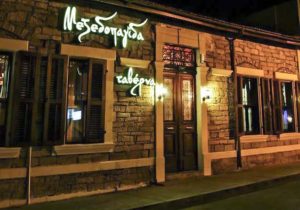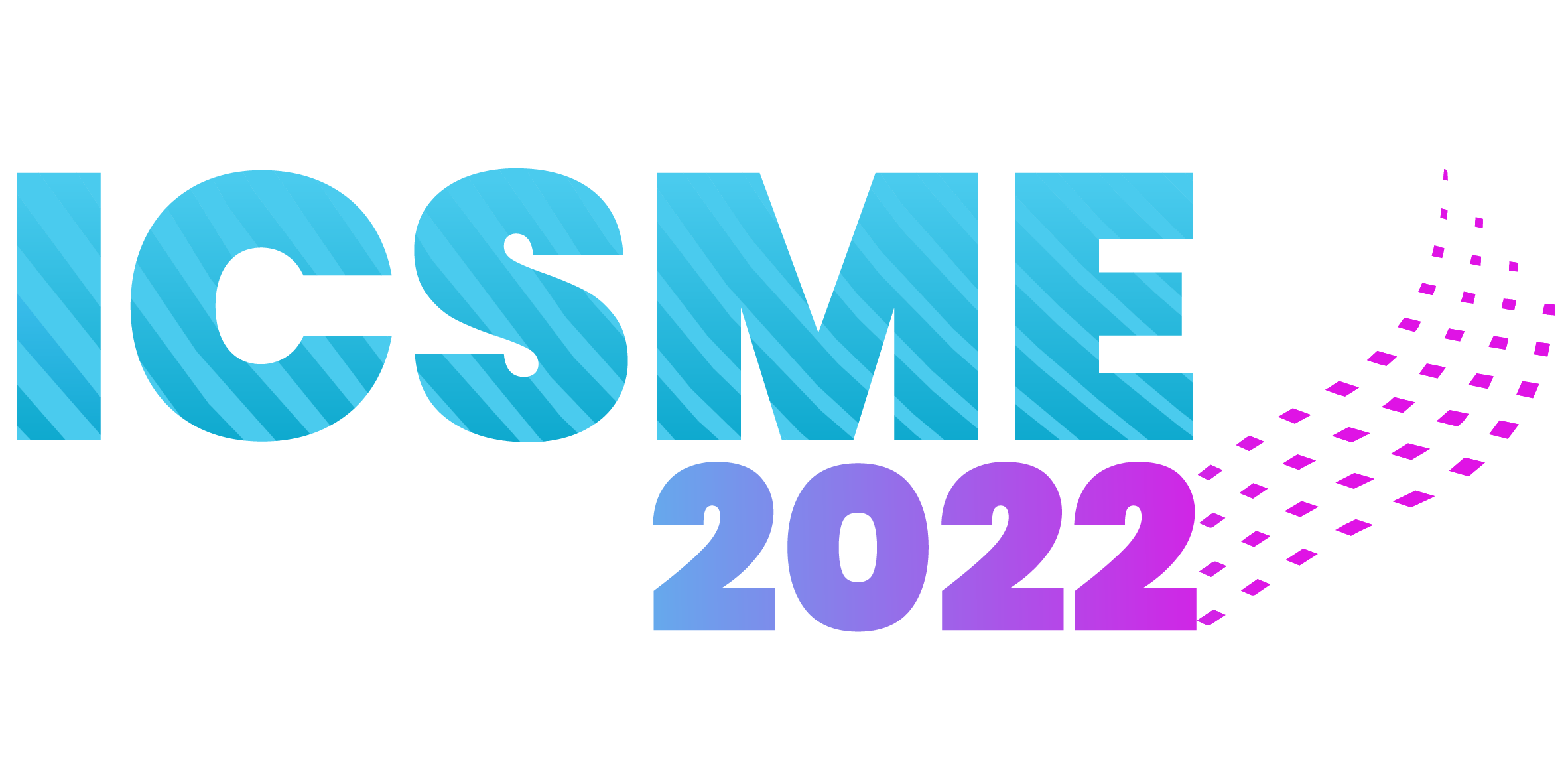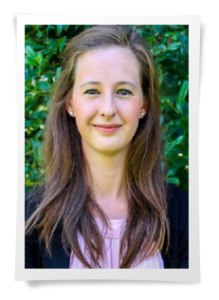Scientific Program
Click on each session or event for more information
or
go to the bottom of the page to seach a pdf conference program
Last Updated 19 September 10:25
|
TUESDAY, 04/10
Doctoral Symposium
|
||
| Time | ROOM ATHENA | |
| 09:00-09:30 | Welcome | |
| 09:30-10:30 | Keynote Speech | |
| 10:30-11:00 | Break | |
| 11:00-12:30 | Short talks and discussion | |
| 12:30-14:00 | Lunch | |
| 14:00-15:30 | Panel | |
| 15:30-16:00 | Break | |
| 16:00-16:45 | Breakout sessions | |
| 16:45-17:00 | Wrap-up | |
|
WEDNESDAY, 05/10
|
||
| Time | Track A (room Mermaid) | Track B (room Athena) |
| 08:30-09:00 | Welcome | |
| 09:00-10:30 |
Keynote Speech (room Mermaid) Chair: Paris Avgeriou Roberto Di CosmoTitle: Software Heritage: a revolutionary infrastructure for Open Science and Open Source |
|
| 10:30-11:00 | Coffee Break with PhD Posters | |
| 11:00-12:30 |
Chairs: Diatmar Pfahl & Valentina Lenarduzzi |
Chairs: Matthias Galster & Dario di Nucci |
| 12:30-14:00 | Lunch with PhD Posters | |
| 14:00-15:30 |
Chair: Gilles Perrouin |
Chairs: Davide Taibi & Mike Godfrey |
| 15:30-16:00 | Coffee / Tools with Cookies | |
| 16:00-17:30 |
Chairs: Mary Papoutsoglou and Christoph Treude |
Chairs: Gemma Catolino & Quentin Stievenart |
| 18:30 | Welcome Reception | |
|
THURSDAY, 06/10
|
||
| Time | Track A (room Mermaid) | Track B (room Athena) |
| 09:00-10:30 |
Keynote Speech (room Mermaid) Chair: Dave Binkley Paige RodegheroTitle: “Hello, World!” Teaching, Onboarding and Supporting Novices & Newcomers |
|
| 10:30-11:00 | Coffee Break | |
| 11:00-12:30 |
Chairs: Raula Kula & Shane McIntosh |
Chairs: Max Di Penta & Vadim Zaytsev |
| 12:30-14:00 | Lunch | |
| 12:30-14:00 |
LGBTIQ lunch Host: Alexander Serebrenik |
|
| 14:00-14:30 |
Most Influential Paper award (room Mermaid) “What Makes a Good Code Example? A Study of Programming Q&A in StackOverflow” Seyed Mehdi Nasehi, Jonathan Sillito, Frank Maurer, and Chris Burns Chair: Max di Penta |
|
| 14:30-15:30 |
Chair: Mike Papadakis |
Smart Contracts and Cryptography Chairs: Ahmed Zerouali & Tom Mens |
| 15:30-16:00 | Coffee Break | |
| 16:00-17:30 |
Panel on Diversity and Inclusion (room Mermaid) Chair: Sonia Haiduc |
|
| 17:30-18:00 | Open SC meeting (room Mermaid) | |
| 18:30 | Banquet | |
|
FRIDAY, 07/10
|
||
| Time | Track A (room Mermaid) | Track B (room Athena) |
| 9:00-10:30 |
Chairs: Sarra Habchi & Dietmar Pfahl |
Chairs: Mike Papadakis & Eleni Constantinou |
| 10:30-11:00 | Coffee Break | |
| 11:00-12:30 |
Chairs: Katsuro Inoue & Mark Hills |
Chairs: Foutse Khomh & Gregorio Robles |
| 12:30-14:00 | Lunch / BOF | |
| 14:00-15:30 |
Chairs: Shane McIntosh & Sarra Habchi |
Chairs: Valentina Lenarduzzi & Alexander Serebrenik |
| 15:30-16:00 | Coffee Break | |
| 16:00-17:30 |
Keynote Speech (room Mermaid) Chair: Dave Binkley Mark Harman |
|
| 17:30-18:00 | Closing Session (room Mermaid) | |
“Ten years ago we (Seyed Mehdi Nasehi, Jonathan Sillito, Frank Maurer, and Chris Burns) published a paper at ICSME called “What Makes a Good Code Example? A Study of Programming Q&A in StackOverflow” that has been cited 382 times. In this talk, I will briefly summarize the results of that work, but more importantly discuss what has happened in the ten years since. This discussion will cover work that has evaluated: (1) the reliability of code examples posted in forums, such as StackOverflow, (2) the value and use of code examples in API documentation, and (3) the reuse of code examples posted to StackOverflow. I will conclude the talk, by discussing code generation tools (such as GitHub Copilot and Polycoder) in the context of learning from code examples.”
Seyed Mehdi Nasehi, Jonathan Sillito, Frank Maurer, and Chris Burns
| Short talks and discussion |
| Widening the Support of Code-Related Tasks via Large Pre-trained Language Models of Code Antonio Mastropaolo and Gabriele Bavota |
| Studying the Strengths and Weaknesses of Code Recommender Systems Matteo Ciniselli and Gabriele Bavota |
| Efficient Combination Of Spectrum-Based Fault Localization and Program Slicing Péter Soha |
| Supporting Video Game Maintenance by Mining Gameplay Videos Emanuela Guglielmi, Simone Scalabrino and Rocco Oliveto |
| Quality Analysis of iOS Applications with Focus on Maintainability and Security Kristiina Rahkema and Dietmar Pfahl |
| The Phantom Menace: Unmasking Security Issues in Evolving Software Emanuele Iannone and Fabio Palomba |
| Assessing and Improving the Quality of Docker Artifacts Giovanni Rosa, Simone Scalabrino and Rocco Oliveto |
| Synthesising Linear API Usage Examples for API Documentation, Seham Alharbi Dimitris Kolovos and Nicholas Matragkas |
| On the Evolution of Code Readability Valentina Piantadosi |
|
Chairs: Diatmar Pfahl & Valentina Lenarduzzi |
| FFL: Fine grained Fault Localization for Student Programs via Syntactic and Semantic Reasoning (Research Track) Thanh-Dat Nguyen, Thanh Le-Cong, Duc-Minh Luong, Van-Hai Duong, Xuan-Bach D. Le, David Lo and Quyet-Thang Huynh |
| OpenCBS: An Open-Source COBOL Defects Benchmark Suite (Research Track) Dylan Lee, Austin Henley, Bill Hinshaw and Rahul Pandita |
| A Scheduling-Driven Approach To Efficiently Assign Bug Fixing Tasks to Developers (Journal First) Vahid Etemadi, Omid Bushehrian, Reza Akbari and Gregorio Robles |
| Impact of Defect Instances for Successful Deep Learning-based Automatic Program Repair (NIER) Misoo Kim, Youngkyoung Kim, Jinseok Heo, Hohyeon Jeong, Sungoh Kim and Eunseok Lee |
| How to Configure Masked Event Anomaly Detection on Software Logs? (NIER) Jesse Nyyssölä, Mika Mäntylä and Martín Varela |
| Selecting Test Cases based on Similarity of Runtime Information: A Case Study of an Industrial Simulator (Industry Track – S) Kazumasa Shimari, Masahiro Tanaka, Takashi Ishio, Makoto Matsushita, Katsuro Inoue and Satoru Takanezawa |
| On Quantifying the Benefits of Dead Code Removal (Industry Track – A) Gunnar Kudrjavets, Ayushi Rastogi, Jeff Thomas and Nachiappan Nagappan |
|
Code Review and Accessibility Chairs: Matthias Galster & Dario di Nucci |
| Exploring the Notion of Risk in Reviewer Recommendation (Research Track) Seyyedfarshad Kazemi, Maxime Lamothe and Shane McIntosh |
| Cross-Modal Contrastive Learning for Code Search (Research Track) Zejian Shi, Yun Xiong, Xiaolong Zhang, Yao Zhang, Shanshan Li and Yangyong Zhu |
| Dazed and Confused: Studying the Prevalence of Atoms of Confusion in Long-Lived Java Libraries (Research Track) Wendell Mendes, Oton Pinheiro, Emanuele Santos, Lincoln Rocha and Windson Viana |
| Together or Apart? Investigating a mediator bot to aggregate bot’s comments on pull requests (NIER) Eric Ribeiro, Ronan Nascimento, Igor Steinmacher, Laerte Xavier, Marco Gerosa, Hugo De Paula and Mairieli Wessel |
| Evolution of Atoms of Confusion across Pull Requests (NIER) Victoria Bogachenkova, Linh Nguyen, Felipe Ebert, Fernando Castor and Alexander Serebrenik |
| Inferring Fine-grained Traceability Links between Javadoc Comment and JUnit Test Code (NIER) Jeewoong Kim and Shin Hong |
|
Chair: Gilles Perrouin |
| AIP: Scalable and Reproducible Execution Traces in Energy Studies on Mobile Devices Olivier Nourry, Yutaro Kashiwa, Bin Lin, Michele Lanza, Gabriele Bavota and Yasutaka Kamei |
| The Visual Debugger Tool Tim Kräuter, Harald König, Adrian Rutle and Yngve Lamo |
| Community Smell Detection and Refactoring on Steroids: The CADOCS Project Gianmario Voria, Viviana Pentangelo, Antonio Della Porta, Stefano Lambiase, Gemma Catolino, Fabio Palomba and Filomena Ferrucci |
| RestTestGen: An Extensible Framework for Automated Black-box Testing of RESTful APIs Davide Corradini, Amedeo Zampieri, Michele Pasqua and Mariano Ceccato |
| CATTO: Just-in-time Test Case Selection and Execution Dario Amoroso d’Aragona, Fabiano Pecorelli, Simone Romano, Giuseppe Scanniello, Maria Teresa Baldassarre, Andrea Janes and Valentina Lenarduzzi |
| COBREX: A Tool for Extracting Business Rules from COBOL Mir Sameed Ali, Nikhil Manjunath and Sridhar Chimalakonda |
| Defuse: A Data Annotator and Model Builder for Software Defect Prediction Stefano Dalla Palma, Dario Di Nucci and Damian Tamburri |
| DiscOrDance: Visualizing Software Developers Communities on Discord Marco Raglianti, Csaba Nagy, Roberto Minelli and Michele Lanza |
| eTagger – An Energy Pattern Tagging Tool for GitHub Issues in Android Projects Shriram Shanbhag, Sridhar Chimalakonda, Vibhu Saujanya Sharma and Vikrant Kaulgud |
| RepoQuester: A Tool Towards Evaluating GitHub Projects Kowndinya Boyalakuntla, Meiyappan Nagappan, Sridhar Chimalakonda and Nuthan Munaiah |
| Perun: Performance Version System Tomas Fiedor, Jiri Pavela, Adam Rogalewicz and Tomas Vojnar |
| VSCode Migrate: Semi-Automatic Migrations for Low Coverage Projects Tim Vahlbrock, Martin Guddat and Tom Vierjahn |
| LiFUSO: A tool for Library Feature Unveiling based on Stack Overflow Posts Camilo Velázquez-Rodríguez, Eleni Constantinou and Coen De Roover |
| AutoPRTitle: A Tool for Automatic Pull Request Title Generation Ivana Clairine Irsan, Ting Zhang, Ferdian Thung, David Lo and Lingxiao Jiang |
|
MODELS Chairs: Davide Taibi & Mike Godfrey |
| Evaluation of Context-Aware Language Models and Experts for Effort Estimation of Software Maintenance Issues (Research Track) Mohammed Alhamed and Tim Storer |
| INFUSE: Towards Efficient Context Consistency by Incremental-Concurrent Check Fusion (Research Track) Lingyu Zhang, Huiyan Wang, Chang Xu and Ping Yu |
| A Conceptual Antifragile Microservice Framework for Reshaping Critical Infrastructures (NIER) Hind Bangui, Bruno Rossi and Barbora Buhnova |
| Adding Context to Source Code Representations for Deep Learning (NIER) Fuwei Tian and Christoph Treude |
| Elevating Jupyter Notebook Maintenance Tooling by Identifying and Extracting Notebook Structures (NIER) Yuan Jiang, Christian Kästner and Shurui Zhou |
| Generating Customised Control-Flow Graphs for Legacy Languages with Semi-Parsing (Industry Track- F) Céline Deknop, Johan Fabry, Kim Mens and Vadim Zaytsev |
|
ROSE festival Chairs: Mary Papoutsoglou and Christoph Treude |
| Artefact accompanying paper 1967 Céline Deknop, Johan Fabry, Kim Mens and Vadim Zaytsev |
| What Is Thrown? Lightweight Precise Automatic Extraction of Exception Preconditions in Java Methods Diego Marcilio and Carlo A. Furia |
| Peeler: Learning to Effectively Predict Flakiness without Running Tests Yihao Qin, Shangwen Wang, Kui Liu, Bo Lin, Hongjun Wu, Li Li, Xiaoguang Mao and Tegawendé F. Bissyandé |
| To what extent can we analyze Kotlin programs using existing Java taint analysis tools? Ranjith Krishnamurthy, Goran Piskachev and Eric Bodden |
| An Empirical Study of Code Smells in Transformer-based Code Generation Techniques Mohammed Latif Siddiq, Shafayat Hossain Majumder, Maisha Rahman Mim, Sourov Jajodia and Joanna Cecilia da Silva Santos |
| Collaborative Software Visualization For Program Comprehension Alexander Krause-Glau, Marcel Bader and Wilhelm Hasselbring |
| Replication pack for “Evaluation of Context-Aware Language Models and Experts for Effort Estimation of Software Maintenance Issues” paper Mohammed Alhamed and Tim Storer |
| How Does This New Developer Test Fit In? A Visualization to Understand Amplified Test Cases — Replication Package Carolin Brandt and Andy Zaidman |
| JOSSE: A Software Development Effort Dataset Annotated with Expert Estimates Mohammed Alhamed and Tim Storer |
| An Empirical Study of Flaky Tests in JavaScript Negar Hashemi, Amjed Tahir and Shawn Rasheed |
| JFeature: Know Your Corpus! Idriss Riouak, Gorel Hedin, Christoph Reichenbach and Niklas Fors |
| Utilizing Software Architecture Recovery to Explore Large-Scale Software Systems in Virtual Reality Adrian Hoff, Lea Gerling and Christoph Seidl |
| Flaky Test Sanitisation via On-the-Fly Assumption Inference for Tests with Network Dependencies Jens Dietrich, Shawn Rasheed and Amjed Tahir |
| Visualizing Memory Consumption with Vismep Alison Fernandez Blanco, Alexandre Bergel, Juan Pablo Sandoval Alcocer and Araceli Queirolo Cordova |
| VizAPI: Visualizing Interactions between Java Libraries and Clients Sruthi Venkatanarayanan, Jens Dietrich, Craig Anslow and Patrick Lam |
| Summary-Based Compositional Analysis for Soft Contract Verification – Artifact Bram Vandenbogaerde, Quentin Stievenart and Coen De Roover |
| An Exploratory Study of Documentation Strategies for Product Features in Popular GitHub Projects Tim Puhlfürß, Lloyd Montgomery and Walid Maalej |
| Artifact for “Benchmark Fuzzing for Android Taint Analyses” Stefan Schott and Felix Pauck |
| Artifact for “Quantifying the Potential to Automate the Synchronization of Variants in Clone-and-Own” Alexander Schultheiß, Paul Maximilian Bittner, Thomas Thüm and Timo Kehrer |
| Git Truck (source code) Thomas Hoffmann Kilbak, Emil Jäpelt, Kristoffer B. Højelse and Jonas G. Røssum |
| RestTestGen Davide Corradini, Amedeo Zampieri, Michele Pasqua and Mariano Ceccato |
| N-Lane Bridge Performance Antipattern Analysis Using System-Level Execution Tracing Riley Vandonge and Naser Ezzati-Jivan |
| Replication package for the study “Exploring the Notion of Risk in Code Reviewer Recommendation” Farshad Kazemi, Max Lamothe and Shane McIntosh |
| Spike – A code editor plugin highlighting fine-grained changes Ronald Escobar Jaldin, Juan Pablo Sandoval Alcocer, Hagen Tarner, Fabian Beck and Alexandre Bergel |
| Removing dependencies from large software projects: are you really sure? Ching-Chi Chuang, Luis Cruz, Robbert van Dalen, Vladimir Mikovsk and Arie van Deursen |
| jFamilyCounselor: Towards the Detection of Hidden Familial Type Correlations in Java Code Alin-Petru Roșu and Petru F. Mihancea |
|
Documentation Chairs: Gemma Catolino & Quentin Stievenart |
| Automatic Pull Request Title Generation (Research Track) Ting Zhang, Ivana Clairine Irsan, Ferdian Thung, Donggyun Han, David Lo and Lingxiao Jiang |
| A First Look at Information Highlighting in Stack Overflow Answers (NIER) Shahla Shaan Ahmed, Shaowei Wang, Haoxiang Zhang, Tse-Hsun Chen and Tian Yuan |
| An Exploratory Study of Documentation Strategies for Product Features in Popular GitHub Projects (NIER) Tim Puhlfürß, Lloyd Montgomery and Walid Maalej |
| Apples, Oranges & Fruits – Understanding Similarity of Software Repositories Through The Lens of Dissimilar Artifacts (NIER) A Eashaan Rao and Sridhar Chimalakonda |
| Mining Annotation Usage Rules: A Case Study with MicroProfile (Industry Track – F) Batyr Nuryyev, Ajay Kumar Jha, Sarah Nadi, Yee-Kang Chang, Emily Jiang and Vijay Sundaresan |
| Learning-based Identification of Coding Best Practices from Software Documentation (Industry Track – F) Neela Sawant and Srinivasan Sengamedu |
|
Ecosystems+SE4AI Chairs: Raula Kula & Shane McIntosh |
| An Empirical Study of Challenges in Converting Deep Learning Models (Research Track) Moses Openja, Amin Nikanjam, Ahmed Haj Yahmed, Foutse Khomh and Zhen Ming Jiang |
| An Empirical Study on the Usage of Automated Machine Learning Tools (Research Track) Forough Majidi, Moses Openja, Foutse Khomh and Heng Li |
| Is Kernel Code Different From Non-Kernel Code? A Case Study of BSD Family Operating Systems (Research Track) Gunnar Kudrjavets, Jeff Thomas, Nachiappan Nagappan and Ayushi Rastogi |
| Taxonomy of Security Weaknesses in Java and Kotlin Android Apps (Journal First) Alejandro Mazuera Rozo, Camilo Escobar-Velásquez, Juan Espitia-Acero, David Vega-Guzmán, Catia Trubiani, Mario Linares-Vásquez and Gabriele Bavota |
| “When the Code becomes a Crime Scene” Towards Dark Web Threat Intelligence with Software Quality Metrics (NIER) Giuseppe Cascavilla, Gemma Catolino, Felipe Ebert, Damian Andrew Tamburri and Willem-Jan van den Heuvel |
|
Refactoring Chairs: Max Di Penta & Vadim Zaytsev |
| RMove: Recommending Move Method Refactoring Opportunities using Structural and Semantic Representations of Code (Research Track) Di Cui, Siqi Wang, Yong Luo, Xingyu Li, Jie Dai, Lu Wang and Qingshan Li |
| The Energy Cost of the Visitor Pattern (Research Track) Déaglán Connolly Bree and Mel Ó Cinnéide |
| Why Don’t XAI Techniques Agree? Characterizing the Disagreements Between Post-hoc Explanations of Defect Predictions (NIER) Saumendu Roy, Gabriel Laberge, Banani Roy, Foutse Khomh, Amin Nikanjam and Saikat Mondal |
| Don’t Reinvent the Wheel: Towards Automatic Replacement of Custom Implementations with APIs (NIER) Rosalia Tufano, Emad Aghajani and Gabriele Bavota |
| Using a Nearest-Neighbour, BERT-Based Approach for Scalable Clone Detection (Industry Track – F) Muslim Chochlov, Gul Aftab Ahmed, James Vincent Patten, Guoxian Lu, Wei Hou, David Gregg and Jim Buckley |
| The Engineering Implications of Code Maintenance in Practice (Industry Track – F) Noah Lee, Rui Abreu, Mehmet Yatbaz, Hang Qu and Nachiappan Napgappan |
|
Registered Reports Chair: Mike Papadakis |
| Fixing Dockerfile Smells: An Empirical Study Giovanni Rosa, Simone Scalabrino and Rocco Oliveto |
| Quality issues in Machine Learning Software Systems Pierre-Olivier Côté, Amin Nikanjam, Rached Bouchoucha and Foutse Khomh |
| Data-access performance anti-patterns in data-intensive systems Biruk Asmare Muse, Kawser Wazed Nafi, Foutse Khomh and Giuliano Antoniol |
| Machine Learning-Based Test Smell Detection Valeria Pontillo, Dario Amoroso d’Aragona, Fabiano Pecorelli, Dario Di Nucci, Filomena Ferrucci and Fabio Palomba |
| On the Adoption and Effects of Source Code Reuse on Defect Proneness and Maintenance Effort Giammaria Giordano, Gerardo Festa, Gemma Catolino, Fabio Palomba, Filomena Ferrucci and Carmine Gravino |
|
Smart Contracts and Cryptography Chairs: Ahmed Zerouali & Tom Mens |
| On the Security of Python Virtual Machines: An Empirical Study (Research Track) Xinrong Lin, Baojian Hua and Qiliang Fan |
| Guiding Automated Test Case Generation for Transaction-Reverting Statements in Smart Contracts (Research Track) Mitchell Olsthoorn, Arie van Deursen and Annibale Panichella |
| Smart Money Wasting: Analyzing Gas Cost Drivers of Ethereum Smart Contracts (Research Track) Benedikt Severin, Marc Hesenius, Florian Blum, Michael Hettmer and Volker Gruhn |
|
Testing Chairs: Sarra Habchi & Dietmar Pfahl |
| Peeler: Learning to Effectively Predict Flakiness without Running Tests (Research Track) Yihao Qin, Shangwen Wang, Kui Liu, Bo Lin, Hongjun Wu, Li Li, Xiaoguang Mao and Bissyandé Tegawendé F. |
| What Is Thrown? Lightweight Precise Automatic Extraction of Exception Preconditions in Java Methods (Research Track) Diego Marcilio and Carlo A. Furia |
| Improving Fault Localization Using Model-domain Synthesized Failing Test Generation (Research Track) Zhuo Zhang, Yan Lei, Xiaoguang Mao, Meng Yan, Xin Xia and Xiaohong Zhang |
| FuzzNT : Checking for Program Non-termination (NIER) Hrishikesh Karmarkar, Raveendra Kumar Medicherla, Ravindra Metta and Prasanth Yeduru |
| Developers Struggle with Authentication in Blazor WebAssembly (NIER) Pascal Marc André, Quentin Pierre Stiévenart and Mohammad Ghafari |
| Automated Server Testing: an Industrial Experience Report (Industry Track – S) Chao Peng, Yujun Gao and Ping Yang |
|
Bug/fault detection II Chairs: Mike Papadakis & Eleni Constantinou |
| An Empirical Study on Performance Bugs in Deep Learning Frameworks (Research Track) Tarek Makkouk, Dong Jae Kim and Tse-Hsun Peter Chen |
| BASHEXPLAINER: Retrieval-Augmented Bash Code Comment Generation based on Fine-tuned CodeBERT (Research Track) Chi Yu, Guang Yang, Xiang Chen, Ke Liu and Yanlin Zhou |
| An Empirical Study on the Fault-Inducing Effect of Functional Constructs in Python (Research Track) Fiorella Zampetti, François Belias, Cyrine Zid, Giuliano Antoniol and Massimiliano Di Penta |
| Just-in-Time Software Vulnerability Detection: Are We There Yet? (Journal First) Francesco Lomio, Emanuele Iannone, Andrea De Lucia, Fabio Palomba and Valentina Lenarduzzi |
| On the Impact of Security Vulnerabilities in the npm and RubyGems Dependency Networks (Journal First) Ahmed Zerouali, Tom Mens, Alexandre Decan and Coen De Roover |
|
Tracing and Cloning Chairs: Katsuro Inoue & Mark Hills |
| Deceiving Deep Neural Networks-Based Binary Code Matching with Adversarial Programs (Research Track) Wai Kin Wong, Huaijin Wang, Pingchuan Ma, Shuai Wang, Mingyue Jiang, Tsong Yueh Chen, Qiyi Tang, Sen Nie and Shi Wu |
| Heterogeneous Vulnerability Report Traceability Recovery by Vulnerability Aspect Matching (Research Track) Jiamou Sun, Zhenchang Xing, Sherry Xu, Liming Zhu and Qinghua Lu |
| Quantifying the Potential to Automate the Synchronization of Variants in Clone-and-Own (Research Track) Alexander Schultheiß, Paul Maximilian Bittner, Thomas Thüm and Timo Kehrer |
| An Effective Approach for Parsing Large Log Files (Research Track) Issam Sedki, Abdelwahab Hamou-Lhadj, Otmane Ait Mohamed and Mohammed Shehab |
| Integrating Software Issue Tracking and Traceability Models (Research Track) Naveen Ganesh Muralidharan, Vera Pantelic, Victor Bandur and Richard Paige |
|
Smell/Debt Chairs: Foutse Khomh & Gregorio Robles |
| What Made This Test Flake? Pinpointing Classes Responsible for Test Flakiness (Research Track) Sarra Habchi, Guillaume Haben, Jeongju Sohn, Adriano Franci, Mike Papadakis, Maxime Cordy and Yves Le Traon |
| A Comparison of Machine Learning Algorithms on Design Smell Detection Using Balanced and Imbalanced Dataset: A Study of God Class (Journal First) Khalid Alkharabsheh, Sadi Alawadi, Victor R. Kebande, Yania Crespo, Manuel Fernández-Delgado and Jose A. Taboada |
| An Empirical Study on Self-Admitted Technical Debt in Modern Code Review (Journal First) Yutaro Kashiwa, Ryoma Nishikawa, Yasutaka Kamei, Masanari Kondo, Emad Shihab, Ryosuke Sato and Naoyasu Ubayashi |
| The Do’s and Don’ts of Infrastructure Code: a Systematic Grey Literature Review (Journal First) Indika Kumara, Martín Garriga, Angel Urbano Romeu, Dario Di Nucci, Fabio Palomba, Damian Andrew Tamburri and Willem-Jan van den Heuvel |
| MUBot: Learning to Test Large-Scale Commercial Android Apps like a Human (Industry Track – F) Chao Peng, Zhao Zhang, Zhengwei Lv and Ping Yang |
|
Dependencies Chairs: Shane McIntosh & Sarra Habchi |
| On the Use of GitHub Actions in Software Development Repositories (Research Track) Alexandre Decan, Tom Mens, Pooya Rostami Mazrae and Mehdi Golzadeh |
| Stronger Together: On Combining Relationships in Architectural Recovery Approaches (Research Track) John Ahn, Evelien Boerstra and Julia Rubin |
| VERJava: Vulnerable Version Identification for Java OSS with a Two-Stage Analysis (Research Track) Qing Sun, Lili Xu, Wei Huo, Yang Xiao and Feng Li |
| GitHub Repositories with Links to Academic Papers: Public Access, Traceability, and Evolution (Journal First) Supatsara Wattanakriengkrai, Bodin Chinthanet, Hideaki Hata, Raula Gaikovina Kula, Christoph Treude, Jin Guo and Kenichi Matsumoto |
| Build Conflicts in the Wild (Journal First) Leuson Mario Pedro da Silva, Paulo Borba and Arthur Pires |
|
Empirical studies Chairs: Valentina Lenarduzzi & Alexander Serebrenik |
| An Empirical Study of Flaky Tests in JavaScript (Research Track) Negar Hashemi,Amjed Tahir and Shawn Rasheed |
| An empirical study on clone consistency prediction based on machine learning (Journal First) Fanlong Zhang and Siau-Cheng Khoo |
| Software Engineering for Quantum Programming: How Far Are We? (Journal First) Manuel De Stefano, Fabiano Pecorelli, Dario Di Nucci, Fabio Palomba and Andrea De Lucia |
| Studying Eventual Connectivity Issues in Android Apps (Journal First) Camilo Escobar-Velásquez, Alejandro Mazuera Rozo, Claudia Bedoya, Michael Osorio-Riaño, Mario Linares-Vásquez and Gabriele Bavota |
| Feature-based software design pattern detection (Journal First) Najam Nazar, Aldeida Aleti and Yaokun Zheng |
| There Ain’t No Such Thing as a Free Custom Memory Allocator (Industry Track – S) Gunnar Kudrjavets, Jeff Thomas, Aditya Kumar, Nachiappan Nagappan and Ayushi Rastogi |

Mark Harman
Software Engineer, Meta Platforms Inc., London.
Title: Challenges in testing and evolving large systems
Abstract: This talk describes experiences in testing and bug fixing on large systems, such as Facebook, Instagram and WhatsApp, operated by Meta Platforms Inc. The talk will consider automatic test case generation, execution and onward repair and evolution. The talk will focus on simulation based approaches to testing, including Sapienz and WW. These simulation-based testing technologies have been deployed to test systems of over 100 million lines of lines of code, daily relied upon by over 2.88 billion people for communications, business, social media and community building (3.65Bn monthly active users). Testing, and in particular automation of onward evolution at this scale poses considerable challenges for scalability. The talk will conclude with open problems and challenges for the research community working on maintenance and evolution of software systems.

Roberto Di Cosmo
Title: Software Heritage: a revolutionary infrastructure for Open Science and Open Source
Abstract: Open Science is a tidal wave that is expected to have a deep and long lasting impact on the way we conduct, share and evaluate research awareness is rising about the fact that software has a key role to play, on par with open access to research articles and data, and that it comes with specific challenges when it comes to archiving, referencing, describing and citing research software. Open Source is at the heart of our digital society and embodies a growing part of our technical and organisational knowledge. It speeds up innovation, but also raises key challenges about the quality, evolution and security of the many components that are put together in modern software systems: how to be sure that the source code of a key module we use will be still there when we need it in the future? do we really know what source code we are using, and where it comes from? how can we adress cybersecurity if we do not know? how do we share this information across the software supply chain?
In this talk we will survey policy news and explore in depth the approach taken by the Software Heritage, an open non-profit initiative, in partnership with Unesco, to preserve, reference and share all the publicly available source code. With 12 billions unique source files from 180 million repositories, it is the
largest archive of source code ever built, and provides the key shared infrastructure to address these questions in the long term.
Paige Rodeghero
Clemson University
Title: “Hello, World!” Teaching, Onboarding and Supporting Novices & Newcomers
Abstract: Entering into an established codebase is, objectively, no fun. Learning how everything works and ties together is a difficult assignment on its own, and it is often compounded from a distinct lack of support given by past and present developers. Cutting down the initial hurdles into a codebase is not only useful within companies that want to do right by their new hires onboarding, but is critical within open-source projects that are inadvertentily pushing away potential contributors. Software development in general is itself challenging for newcomers. Particularly for the neuro-diverse population, who may find standard learning material less effective. This talk will focus on my research into onboarding within Microsoft, open-source community interactions, and autistic-developer focused software education. This talk will discuss various pain-points developers experience and will cover beneficial strategies for codebases and communities. In short, this talk is about how we can best live up to the iconic phrase: “Hello, World!”
Tour & Conference Banquet
Date: Thursday, 6th of October
Departure Time: 18:30
Departure From: The Venue Hotel
We will get together at the lobby of the Venue Hotel, from where we will promptly depart in air-conditioned coaches for a city tour. A professional guide will tell us about the history of Cyprus and Limassol Town in particular. Dinner will take place at the Mezedopagida traditional, award winning tavern, serving excellent dishes of Cypriot cuisine. Our dinner will be complimented with local drinks and desserts and live music.
The Conference Dinner is included in ICSME Registration fees.
Ticket per accompanying person or Reduced Fee participant: 70 euro

Welcome Reception
Date: Wednesday, 5th of October
Time: 18:30
Where: Venue Hotel Pool Veranda
Welcome Reception is the first social gathering between all conference delegates and it will take place at the Venue Hotel. It will be a relaxing evening during which delegates will have the opportunity to talk to colleagues and peers, while enjoying local drinks and ample canapés.
The Welcome Cocktail is included in all Registration Types.
Ticket per accompanying person : 40 euro


